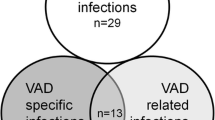Abstract
For the purposes of this chapter, we will discuss the management of infections of devices used in solid organ transplant (SOT). Post transplantation, SOT recipients frequently require additional interventions including central venous access catheters (CVC) or, occasionally, temporary support with extracorporeal membrane oxygenation (ECMO) intervention. Infections in these devices will be addressed. Furthermore, we will review infections associated with ventricular assist devices (VAD) when used as bridges to heart transplant (HT). Infection remains a significant complication of LVAD implantation and is associated with inferior clinical prognosis. This is especially true in patients who develop more serious systemic infections, such as sepsis, where the mortality in the following 2 years can be greater than 50%. Furthermore, the development of multi-organ dysfunction (especially cardiac and renal) is also frequently seen as sequelae of infection and complicates morbidity and mortality considerably. The ongoing management of mechanical circulatory device (MCS) infections in patients who proceed to transplant will also be discussed in this chapter, as these patients suffer more frequent relapse associated with retained material from their infected device.
CVC, ECMO, and VAD infections all share features that create unique infection risk, in that they all contain a foreign material placed with a percutaneous exit site and an internal, intravascular component.
Signs and symptoms of systemic device-associated infection may be subdued in the SOT recipient. The differential for potential pathogens may be broader in the immunocompromised postoperative host, not only because of their immunosuppression but also because of their frequent hospital exposure. Furthermore, the HT who was bridged with an initially infected VAD has a potentially increased risk for multidrug-resistant (MDR) infections due to antibiotic exposures, though this has not been well studied or documented in the current literature. Diagnosis and management of these infections will be discussed.
Access this chapter
Tax calculation will be finalised at checkout
Purchases are for personal use only
Similar content being viewed by others
References
Aubron C, Cheng A, Picher D, et al. Infections acquired by adults who receive extracorporeal membrane oxygenation: risk factors and outcomes. Infect Control Hosp Epidemiol. 2013;34(1):24–30.
Bizzaro M, Conrad S, Kaufman D, et al. Infections acquired during extracorporeal membrane oxygenation in neonates, children and adults. Pediatr Crit Care Med. 2011;12:277–81.
Aubron C, Pilcher D, Leong T, et al. Aspergillus sp. Isolated in critically ill patients with extracorporeal membrane oxygenation support. Scand J Infect Dis. 2013;45(9):715–21.
Garcia X, Mian A, Mendiratta P, et al. Aspergillus infection and extracorporeal membrane oxygenation support. J Intensive Care Med. 2013;28(3):178–84.
Hannan MM, Husain S, Mattner F, et al. Working formulation for the standardization of definitions of infections I patients using ventricular assist devices. J Heart Lung Transplant. 2011;30:375–84.
Nienaber J, Wilhelm MP, Sohail MR. Current concepts in the diagnosis and management of left ventricular assist device infections. Expert Rev Anti Infect Ther. 2013;11(2):201–10.
Kusne S, Mooney M, Danziger-Isacov L, et al. An ISHLT consensus document for preventions and management strategies for mechanical circulatory support infections. J Heart Lung Transplant. 2017;36:1137–53.
Maly J, Szarszoi O, Netuka I, et al. Fungal infections associated with long-term mechanical circulatory support-diagnosis and management. J Card Surg. 2014;29:95–100.
Baker A, Lewis S, Alexander B, et al. Two-phase hospital-associated outbreak of Mycobacterium abscessus: investigation and mitigation. Clin Infect Dis. 2017;64(7):902–11.
Balsam L, Louie E, Hill F, et al. Mycobacterium chimaera left ventricular assist device infections. J Card Surg. 2017;32(6):402–4.
Juneau D, Golfam M, Hazra S, et al. Positron emission tomography and single-photon emission computed tomography imaging in the diagnosis of cardiac implantable electronic device infection: a systematic review and meta-analysis. Circ Cardiovasc Imaging. 2017;10:e005772.
Holek M, Kettner J, Franeková J, Jabor A. Procalcitonin levels in patients undergoing left ventricular assist device implantation. Crit Care. 2015;19(Suppl 1):P61.
Brown M, Bishburg E, Nagarakanti S, Divita M. The role of procalcitonin in the diagnosis of bacterial infections in patients with cardiac devices and orthotopic heart transplant. Open Forum Infect Dis. 2015;2(Suppl_1):245.
Association for Prevention of Infection Control and Epidemiology—Guide to Preventing Central Line Bloodstream Infections. Accessed 15 Oct 2017. https://apic.org/Resources/Topic-specific-infection-prevention/Central-line-associated-bloodstream-infections.
ELSO Guidelines for Cardiopulmonary Extracorporeal Life Support Extracorporeal Life Support Organization, Version 1.4 August 2017 Ann Arbor, MI, USA. www.elso.org.
Zakhour R, Chaftari A, Raad I. Catheter-related infections in patients with haematological malignancies: novel preventive and therapeutic strategies. Lancet Infect Dis. 2016;16(11):e241–50.
McGhee W, Michaels M, Martin J, et al. Antifungal lock therapy with liposomal amphotericin B: a prospective trial. J Pediatric Infect Dis Soc. 2016;5(1):80–4.
Wolf J, Connell T, Allison K, et al. Treatment and secondary prophylaxis with ethanol lock therapy for central line-associated bloodstream infection in paediatric cancer: a randomised, double-blind, controlled trial. Lancet Infect Dis. 2018;18:854–63.
Author information
Authors and Affiliations
Corresponding author
Editor information
Editors and Affiliations
Rights and permissions
Copyright information
© 2019 Springer Nature Switzerland AG
About this chapter
Cite this chapter
Wolfe, C.R., Mooney, M.L. (2019). Management of Infections of Devices: Catheter-Related Infections, Pretransplant VAD Infections, Infections of ECMO Devices. In: Manuel, O., Ison, M. (eds) Infectious Diseases in Solid-Organ Transplant Recipients. Springer, Cham. https://doi.org/10.1007/978-3-030-15394-6_19
Download citation
DOI: https://doi.org/10.1007/978-3-030-15394-6_19
Published:
Publisher Name: Springer, Cham
Print ISBN: 978-3-030-15393-9
Online ISBN: 978-3-030-15394-6
eBook Packages: MedicineMedicine (R0)




